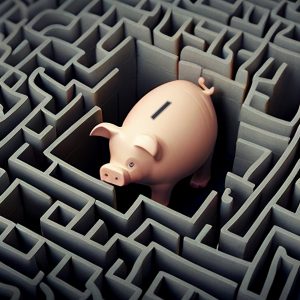The best order of operations for where to put your savings depends on where it will be most helpful in moving you toward your personal financial goals. This sequence can be different for everyone but there are some basic principles for determining where to best allocate your savings for debt reduction and investing.
In what order should I invest money?
- Emergency fund.
- 401k plan minimum 100% match.
- High interest credit card debt.
- Taxable brokerage account
- Lower interest debt
- Maximum contribution 401k or IRA
- Health savings account (HSA)
Emergency fund
The best place to put your savings first is in an account to cover any emergencies that come up in your life. This money needs to be in a place that’s easy to get to when needed. It should be at least three months of living expenses to create a bridge when needed between jobs or to cover a car being fixed or to replace an appliance when needed. If it’s spent it needs to be replaced before continuing any of the other steps we will be discussing. The point of this savings is to invest money in not needing to use debt going forward are having to withdraw from another investing account because you are short cash.
401k plan minimum 100% match
The second best place to save and invest your money is for an immediate 100% return. In the United States most large corporations have 401K retirement matching programs. These are tax deferred retirement programs where the employer will match what the employee deposits into the account.
Each company has different matching levels, some will match your income up to 5%, others more, others less. If you make $50,000 a year and put in 5% of your income each week by the end of the year you will have contributed $2,500 from your own salary. The company will match your funds deposited with an additional $2,500 over the year dollar for dollar. You would contribute approximately $50 a week into your account automatically and the company also puts in $50. Your $50 becomes $100 for a 100% return at the start. This is based on a 5% employer match.
In addition, this is pretax money in a traditional 401K so you are deferring taxes until you withdraw the money and use it which may be in 30+ years or more. You get your tax free 100% return off the top and the capital gains and dividends from investments also grow tax free until you need it at retirement.
High interest credit card debt
The third best use of extra money is to use any savings for paying off high interest rate credit card debt. Getting rid of these high interest rates on your debt will usually be better than the returns you can make investing in the stock market. You should not start a taxable brokerage account before you have paid off all your high interest credit card debt. Paying high interest rates is like investing backwards, you are paying the bank high returns on their capital instead of earning investment returns on your own capital.
Lower interest debt
Next up would be paying off other small loans like car debt, paying back any family or friends you owe money to, or any personal loans. Getting out of debt is a step that comes before rushing into investing or trading capital. If you’re in debt you are not ready to invest money yet because you don’t have any capital, you’re just working to pay bills and then buy extra things above your means. You may have to increase your income or decrease your spending to prepare for investing.
Maximum contribution 401k or IRA
High income individuals would have better tax optimization to max out their tax deferred 401k or traditional IRA before they start investing or trading with a taxable brokerage account. This helps lower their high percentage tax burden and allow capital to grow before income taxes are paid and to also compound tax free until withdrawal.
People starting out at lower income tax brackets could better optimize later tax consequences by maxing out a Roth 401k or Roth IRA so they can pay taxes now at a lower tax rate instead of later at retirement if they are then in a higher tax rate. Income taxes are a top expense for high income earners and minimizing taxes is an important step in investing before moving into taxable accounts.
Taxable brokerage account
A taxable investing and trading account is the place where an investor or trader can speculate on higher risk stocks and assets after they have maxed out their retirement plans and optimized taxes. This is where bigger risks can be taken outside traditional investing strategies. This is your speculative capital that will not effect your living standards whether you win or lose. This is the best place for implementing quantified trading systems with an edge.
Health savings account (HSA)
The advantage of a health a savings account also known as an HSA may not be for everyone. If you’re young, single, and healthy then your money may be better used in the above areas. However, if you have a large family and are older with a high income this can be a great strategy for optimizing taxes while also paying medical bills.
In order to contribute to an HSA you need to be eligible to do so and must be covered under a qualified high deductible health plan before you can contribute to an HSA. However if you do qualify this is a great way to save money for future health related expenses as it offers what’s known as a triple tax benefit. Your contributions are tax deductible so your money grows tax deferred while in the HSA. You can withdraw money from your HSA tax-free as long as it’s used to pay for qualified medical expenses. This is a work around for high income taxes to pay medical costs with pretax dollars.
Is paying off a mortgage a good idea?
Paying off a mortgage is not as important to me if it has a low interest rate. It can be beneficial to carry a mortgage if inflation is running high as today’s dollars are worth more than tomorrow’s dollars. Also during a bullish stock market returns can be much higher than your mortgage interest rate. Paying off a house can make you house rich and cash poor. I have had enough capital to pay off my house for the past 20 years and have always chosen to keep my capital and keep my mortgage.
I hope this post is helpful in figuring out your own optimal order for investing your money based on your own priorities and goals.

